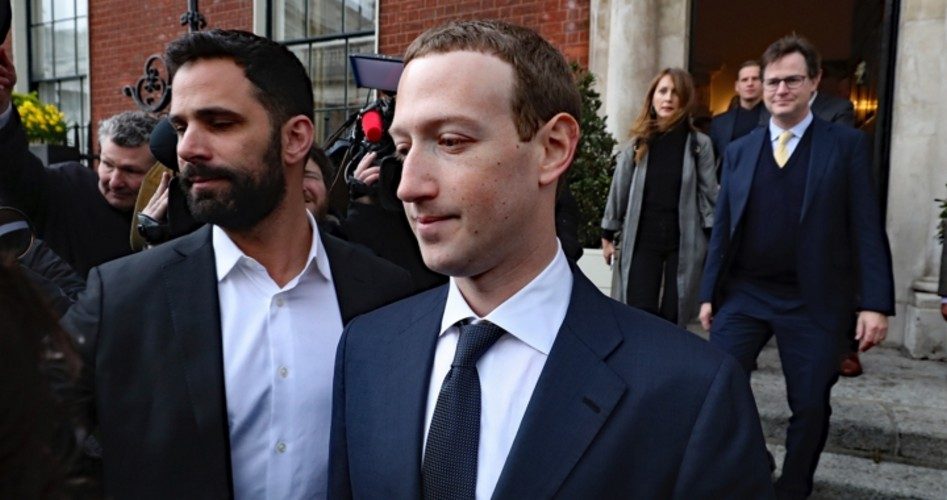
The co-founder of Facebook says it’s time to break up the social-media behemoth because it is a dangerous, out-of-control corporate predator that threatens the country.
But Chris Hughes’s long piece in the New York Times also says Facebook tycoon Mark Zuckerberg is too powerful, that no one man should control what Zuckerberg controls.
Zuckerberg, Hughes wrote, is dangerous on two main counts: His two-fisted iron grip on the social-media market, in which he has virtually zero competition, and, most significantly, on speech. He not only controls access to what should be a growing market of new competitors, but also what people can say to each other, and to the world.
That, Hughes argues, is intolerable.
Zuckerberg’s Control of the Market
“Mark’s influence is staggering, far beyond that of anyone else in the private sector or in government,” Hughes wrote.
How is that?
He controls three core communications platforms — Facebook, Instagram and WhatsApp — that billions of people use every day. Facebook’s board works more like an advisory committee than an overseer, because Mark controls around 60 percent of voting shares. Mark alone can decide how to configure Facebook’s algorithms to determine what people see in their News Feeds, what privacy settings they can use and even which messages get delivered. He sets the rules for how to distinguish violent and incendiary speech from the merely offensive, and he can choose to shut down a competitor by acquiring, blocking or copying it.
Facebook’s omnipotence — it owns WhatsApp, Messenger, and Instagram — means it “faces no market-based accountability.”
Consider the data: “70 percent of American adults use social media, and a vast majority are on Facebook products.” Facebook claims 2.3 billion monthly users. WhatsApp has 1.6 billion; Messenger, 1.3 billion; and Instagram, one billion.
Thus, “even when people want to quit Facebook, they don’t have any meaningful alternative.”
And Facebook did not become a monopoly by accident, Hughes explained. It’s strategy is total market dominance, which government regulators approved. Facebook’s financial power is such that it needn’t worry about monetary penalties for running afoul of government regulations.
“In one of the government’s few attempts to rein in the company,” Hughes wrote, “the [Federal Trade Commission] in 2011 issued a consent decree that Facebook not share any private information beyond what users already agreed to. Facebook largely ignored the decree. Last month, the day after the company predicted in an earnings call that it would need to pay up to $5 billion as a penalty for its negligence — a slap on the wrist — Facebook’s shares surged 7 percent, adding $30 billion to its value, six times the size of the fine.”
The FTC should not have allowed Facebook to purchase Instagram and Whatsapp because, while “lacking any meaningful revenue,” they cemented Facebook’s control of the social-media market.
That monopolistic power has also permitted it to beat the competition by imitating abstract technological concepts without stealing technology outright. That stifles investment because investors know Facebook will either imitate a new technology or buy a successful start-up.
Zuckerberg’s Control Over Speech
But Zuckerberg’s control of the market isn’t as worrisome as his “unilateral control over speech,” Hughes wrote. “There is no precedent for his ability to monitor, organize and even censor the conversations of two billion people.”
Engineers “write algorithms that select which users’ comments or experiences end up displayed in the News Feeds of friends and family,” and underpaid contractors “enforce the rules that Mark and senior executives develop.” Frighteningly, “after a few weeks of training,” those contractors exercise virtual control of any given user’s Facebook account.
Hughes averred that the “most extreme example of Facebook manipulating speech” occured in 2017, when he blocked both sides of the conflict in Myanmar from sending messages. Zuckerberg acted on his own, “with no accountability to any independent authority or government.” Thus, Hughes concluded, Zuckerberg could “delete en masse the messages of Americans, too, if its leadership decided it didn’t like them.”
Facebook has already done so in some ways. Just days ago, it permanently banned “dangerous” figures Alex Jones, Louis Farrakhan, Laura Loomer, and Milo Yiannopoulos.
Hughes asserted that Facebook is no longer a “social utility” as Zuckerberg claimed, or a bulletin board “for people to communicate what they wished.” Although no one at the company chooses what news an American will see, someone decides “whether it will be an article from a reputable outlet or a clip from The Daily Show, a photo from a friend’s wedding or an incendiary call to kill others.”
Maybe, but given that Facebook’s workforce of social justice warriors bans those they don’t like, or manipulates their feeds, the question becomes who decides what those “reputable outlets” are.
Breaking up the company as Hughes wants, by “undoing the Instagram and WhatsApp acquisitions and banning future acquisitions for several years,” won’t change that.
Nor will a “new agency empowered by Congress to regulate tech companies” with a “first mandate” to “protect privacy.”
Tens of millions of people leaving Facebook, Instagram, and WhatsApp would.
Photo: AP Images



